-
-
Mushrooms of the Carolinas and the Southern Appalachian Region
Highlands Biological Station 265 North 6th St, Highlands, NC, United StatesInstructors: Alan and Arleen Bessette Due to this workshop’s popularity, priority will be given to those who haven’t taken the workshop before. This workshop will focus on the mycological diversity of North & South Carolina, and the Southern Appalachian Region. Activities will consist of lectures/presentations on topics such as (but not limited to): Identification Techniques, Major Groups of Fungi, Ecology, Edibility & Toxicity; daily field work (forays); and laboratory/class activities where participants will be introduced to the use of field keys, microscopy, documentary photographic techniques, and more. Designed for beginners wanting a solid introduction to mycology, and for more advanced individuals wishing to pursue their personal mycological interests, this workshop facilitates learning in a relaxed group setting in a unique and mycologically rich area. Cost: $500 workshop fee + $300 housing fee (strongly encouraged) For more information, visit https://highlandsbiological.org/summer-workshops/.
-
Forest Ecosystems of the Southern Appalachians
Highlands Biological Station 265 North 6th St, Highlands, NC, United StatesInstructors: Dr. Steph Jeffries (NC State Univesity), Dr. Alan Weakley (UNC-Chapel Hill), and Dr. Julie Tuttle (UNC-Chapel Hill) Check back later for a description and pre-requisites. For more information, visit https://highlandsbiological.org/summer-2023-academic-courses/.
-
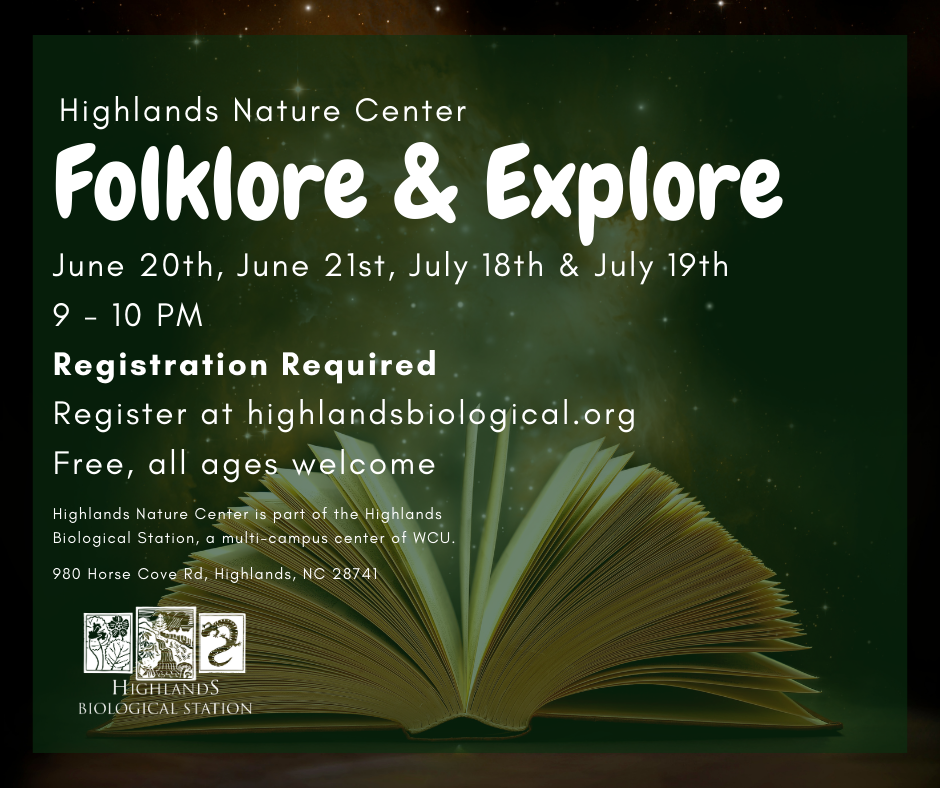
Folklore & Explore
Highlands Nature Center 930 Horse Cove Rd., Highlands, NC, United StatesJuly 18th (Register HERE) 9 - 10 PM FREE, all ages welcome Registration required Curious about old wives’ tales, superstitions, & Sasquatch? Explore the natural, night-time beauty of the Botanical Garden while unearthing fascinating tales of Appalachian lore. Please bring a flashlight for this adventure! This program is weather-dependent.
Free -

Folklore & Explore
Highlands Nature Center 930 Horse Cove Rd., Highlands, NC, United StatesJuly 19th (Register HERE) 9 - 10 PM FREE, all ages welcome Registration required Curious about old wives’ tales, superstitions, & Sasquatch? Explore the natural, night-time beauty of the Botanical Garden while unearthing fascinating tales of Appalachian lore. Please bring a flashlight for this adventure! This program is weather-dependent.
Free -
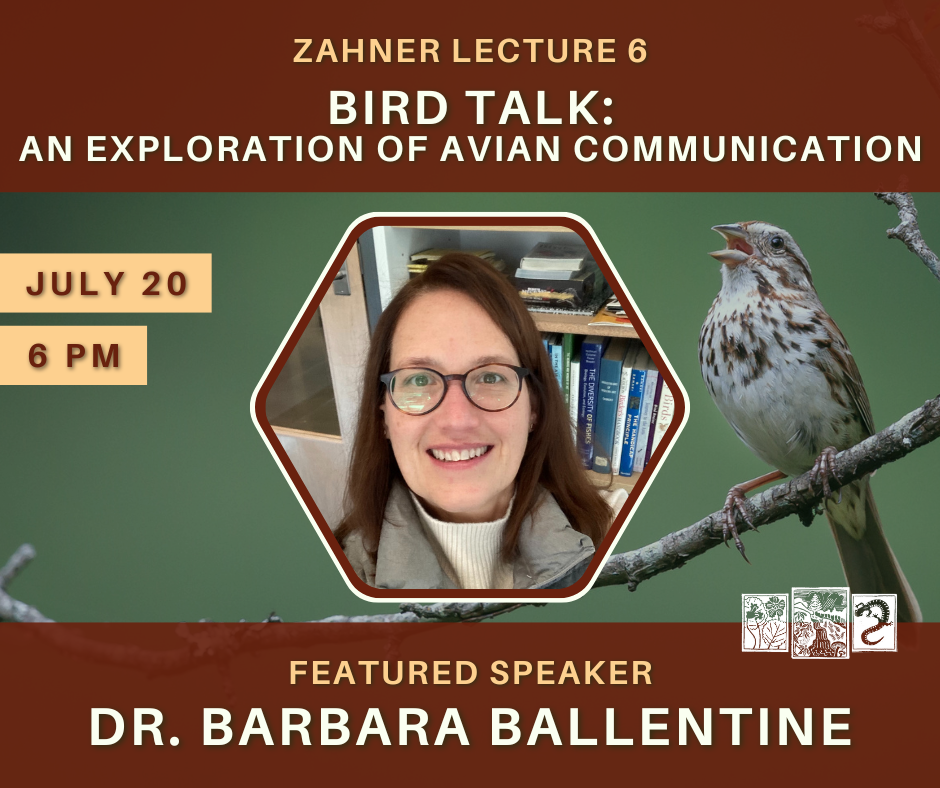
Zahner Lecture 6
Highlands Nature Center 930 Horse Cove Rd., Highlands, NC, United StatesLecture 6 - Bird Talk: An Exploration of Avian Communication Featured Speaker: Barbara Ballentine, Ph.D.; Associate Professor; Western Carolina University Date: Thursday, July 20th Time: 6pm – 7pm Cost: FREE Sponsored by Miriam & Vernon Skiles and Mary Todd & Jimmy Davis. Birds use acoustic, visual, and even olfactory signals in social contexts that are important for successful reproduction and survival. Signaling works because it offers advantages to both the sender and receiver. Understanding how signals are used by birds to communicate provides insight into the amazing lives of birds.
Free -
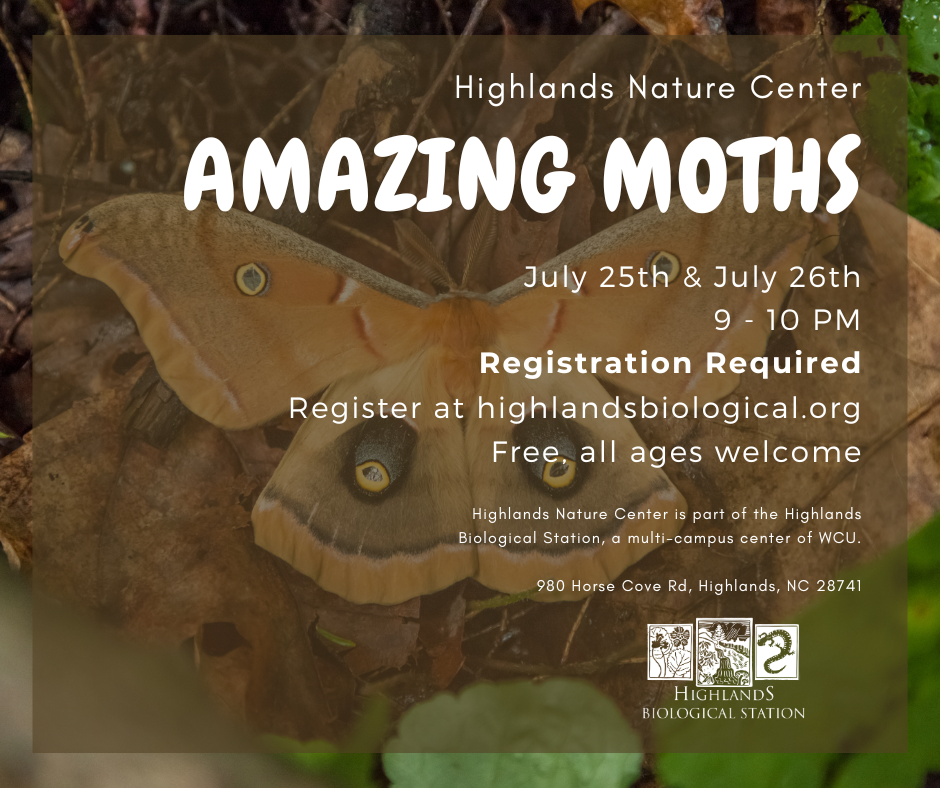
Amazing Moths
Highlands Nature Center 930 Horse Cove Rd., Highlands, NC, United StatesJuly 25th (Register HERE) 9-10 PM FREE, all ages welcome Registration required Celebrate National Moth Week with us! Learn about the many kinds of moths that call our area home, then join naturalists to see which ones we can find in the Botanical Garden. Please bring a flashlight for this adventure! This program is weather-dependent.
Free -

Amazing Moths
Highlands Nature Center 930 Horse Cove Rd., Highlands, NC, United StatesJuly 26th (Register HERE) 9-10 PM FREE, all ages welcome Registration required Celebrate National Moth Week with us! Learn about the many kinds of moths that call our area home, then join naturalists to see which ones we can find in the Botanical Garden. Please bring a flashlight for this adventure! This program is weather-dependent.
Free -
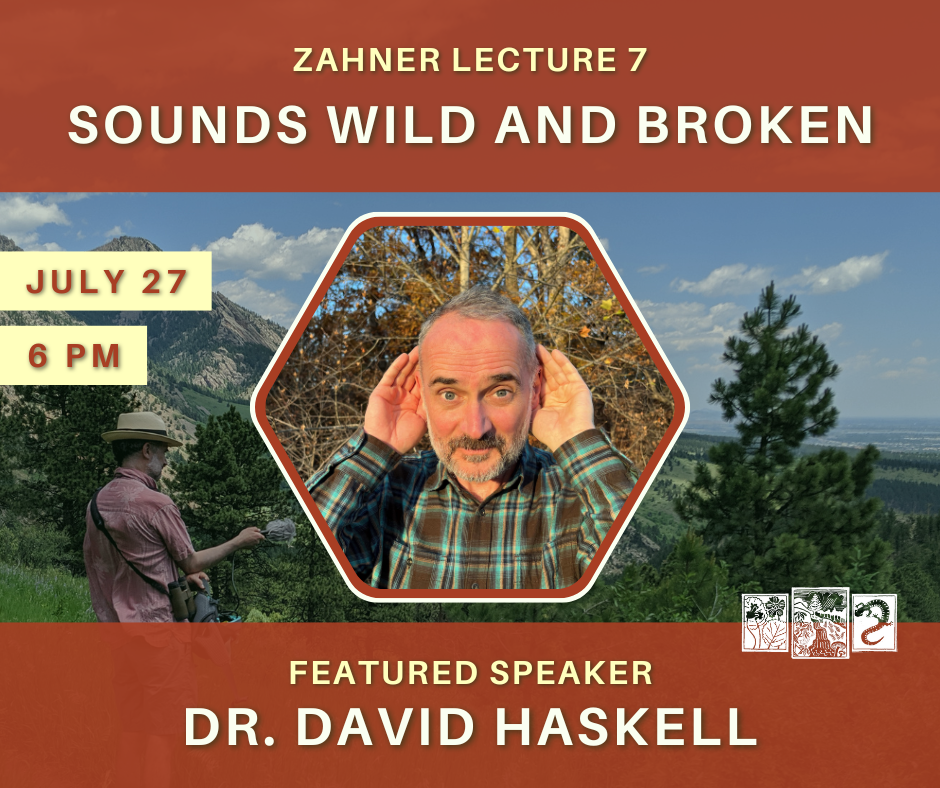
Zahner Lecture 7
Highlands Nature Center 930 Horse Cove Rd., Highlands, NC, United StatesLecture 7 - Sounds Wild and Broken Featured Speaker: David George Haskell, Ph.D.; Author and William R. Kenan Jr. Professor; University of the South Date: Thursday, July 27th Time: 6pm – 7pm Cost: FREE Sponsored by Rosemary & Bill Stiefel. Sonic communication was a late-comer to the evolution of life on Earth. But once song got started, the links that it forged became powerful generative forces. Today, the diverse sounds around us – from chirping crickets, to birdsong, to the human music in our earbuds – reveal the many layers of this evolutionary and cultural creativity. Yet sonic diversity is also threatened worldwide. Using examples from his own explorations of sound, Haskell will show how attention to the sensory richness of the world, especially its sonic dimensions, can root and guide exploration, ethics, and action.
Free -
-
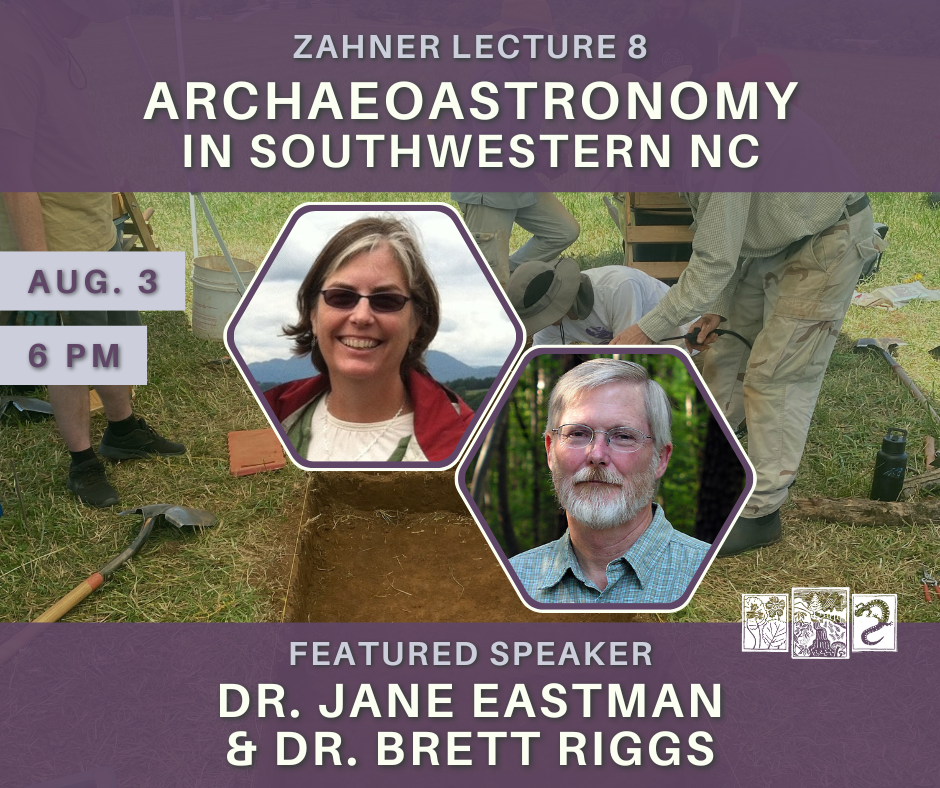
Zahner Lecture 8
Highlands Nature Center 930 Horse Cove Rd., Highlands, NC, United StatesLecture 8 - Archaeoastronomy in Southwestern North Carolina Featured Speakers: Jane M. Eastman, Ph.D.; Associate Professor; Anthropology and Sociology Department; Western Carolina University & Brett Riggs, Ph.D.; Sequoyah Distinguished Professor of Cherokee Studies; Western Carolina University Date: Thursday, August 3rd Time: 6pm – 7pm Cost: FREE Sponsored by Suzanne & Don Duggan, Julie Farrow, Florence & Tom Holmes, Ruthie & Franko Oliver, Adele & Nick Scielzo, and Margaret Waters. In ancient Cherokee perspective, the matters of this world, the Above World and the Beneath World intertwine, and Cherokee peoples constructed ritual landscapes to engage the beings and forces of these realms. Recent investigations in the Little Tennessee River Valley have revealed one such landscape that marks astronomical phenomena and bespeaks sophisticated systems for measuring calendrical time and the cycles central to Cherokee life. These patterns indicate complex observational sciences that guided functions of indigenous societies long before European contact.
Free -
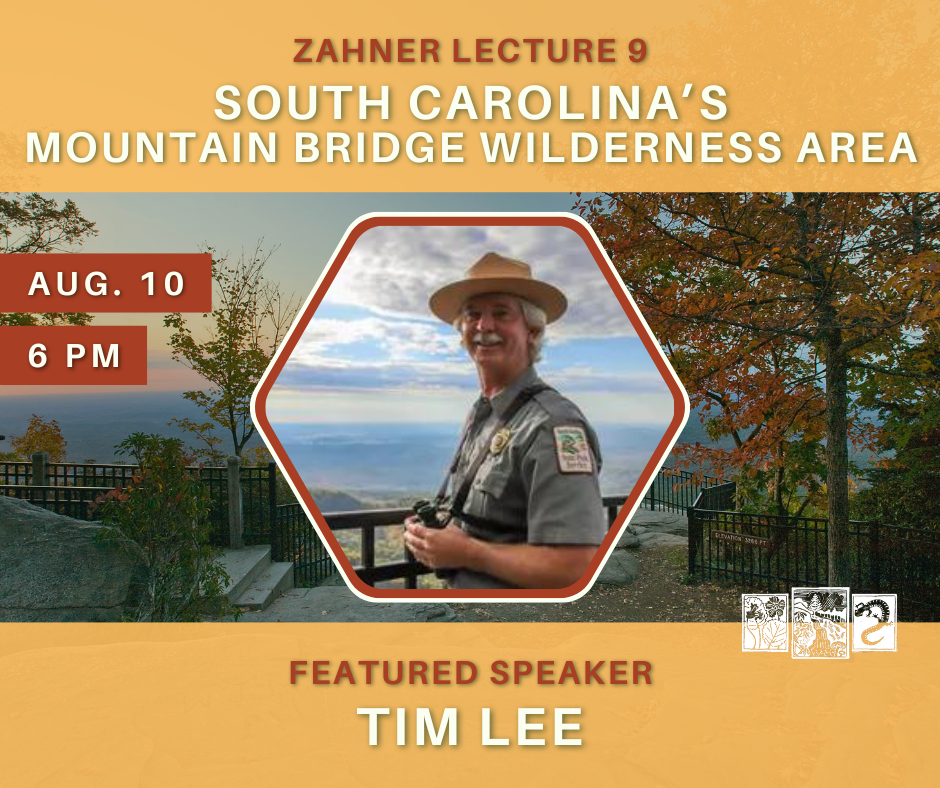
Zahner Lecture 9
Highlands Nature Center 930 Horse Cove Rd., Highlands, NC, United StatesLecture 9 - South Carolina’s Mountain Bridge Wilderness Area Featured Speaker: Tim Lee; Interpretive Ranger/Naturalist; Mountain Bridge Wilderness Area Date: Thursday, August 10th Time: 6pm – 7pm Cost: FREE Sponsored by Martha & Michael Dupuis, Monte & Palmer Gaillard, and Melanie & Tom Mauldin. Located in an area along the Blue Ridge Escarpment, the Mountain Bridge Wilderness Area provides a habitat for a diversity of biological communities adapted for life along the Blue Ridge Escarpment. With high average rainfall, diverse topography, and miles of streams and rivers many species found there are rare within the state and some are found in few other places in the world.
Free
10 events found.

Recent Comments